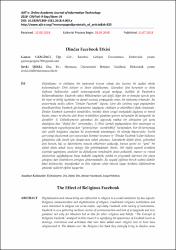| dc.contributor.author | Işıklı, Şevki | |
| dc.contributor.author | Gezginci, Gamze | |
| dc.date.accessioned | 2019-01-28T08:04:59Z | |
| dc.date.available | 2019-01-28T08:04:59Z | |
| dc.date.issued | 2018-07-11 | |
| dc.identifier.issn | 1309-1581 | |
| dc.identifier.uri | http://hdl.handle.net/11363/1013 | |
| dc.description.abstract | Dijitalleşme ve etkileşim, bir toplumsal kurum olarak din üzerine iki açıdan etkide bulunmaktadır: Dini iletişim ve dinin dijitalleşmesi. Geleneksel dini kurumlar ve dinle ilgilenen kullanıcılar, çeşitli motivasyonlarla sosyal medyayı, özellikle de Facebook’u kullanmaktadırlar. Facebook sadece Müslümanlar için değil, diğer din ve inançlar için de yeni bir irşat ve tebliğ (açıklama ve davet) vasıtası, propaganda aracı, bir toplanma ortamıdır. Bu araştırmada analiz edilen “Dindar Facebook” olgusu; içine din katılmış veya paylaşımları dinselleştirilmiş Facebook görünümlerini (paylaşım, etkileşim ve etkinlikleri) ifade etmektedir. Dindar Facebook üzerinden sürdürülen, temelde dinin sosyal medyadaki algılanış ve temsil biçimi, amacı ve etkisine dair fırsat ve tehditleri gündeme getiren tartışmalar iki kategoride ele alınabilir: 1) Dijitalleşmenin geleneksel din algısında radikal bir dönüşüme yol açma olasılığına dair “dijital din” tartışmaları, 2) Dini içerikli paylaşımların dinî samimiyet ve mahremiyete uygunluğuna dair “gösteriş/riya - teşvik/tebliğ” tartışmaları. Her iki tartışmaya dair çeşitli bulgulara ulaşılan bu araştırmada tamamlayıcı iki tekniğe başvuruldu: Teorik çevrçeveyi oluşturmak için başvurulan literatür taraması ve “Dindar Facebook”a dair kullanıcı görüşlerini elde etmek için oluşturulan anket çalışması. Literatürde dijital dinin, geleneksel dini kurum, kişi ve doktrinlerin mevcut etkilerinin azalacağı, bunun yerini ise “yeni” bir dijital dinin almak üzere olduğu dile getirilmektedir. Bizim, 200 kişilik seçmeli örneklem üzerinde yaptığımız analizler ise dijitalleşme trendindeki dinin psikolojik, manevi ve ruhsal işlevlerinin zayıfladığına; buna mukabil sosyolojik, politik ve pragmatik işlevinin öne plana çıktığına dair eleştirilerin arttığını göstermektedir. Bu negatif eğilimin birçok nedeni olabilir fakat kullanıcılar, muhafazakar ve dini söyleme sahip mevcut siyasi iktidarla ilişkilendirme yönünde ciddi bir eğilim taşıyorlar. | en_US |
| dc.description.abstract | Digitalization and interactivity are influnetial in religion as a social institution by two aspects: Religious communication and digitalization of religion. Traditional religious institutions and users interested in religion use social media, especially Facebook, with variety of motivations. Facebook is as a gathering medium, means of communication and tool of propaganda and new guidance not only for Muslims but ol also for other religions and beliefs. “The Cencept of Religious Facebook" analyzed in this research is signifying the appearance of Facebook (such as sharings, interations and activities) that have been added some religion into or have been religiousized it. The debates over the Religious Facebook they maingly bring to disclose some oppurtunities and threats to the way of perception and representation of religion in social media, its purpose and effects can be handled in two categories: 1) “Digital religion debates” on the possibility of digitalization to lead to a radical transformation of traditional perception of religion. 2) Presentation/hypocrisy [ryya]- stimulatation/conveying debates on appropriatness of sharings with religious content to religious sincerity and privacy. In this research which reached various findings on both debates, it is applied two complementary techniques: The first is a the literature search referenced to construct the theoretical frame; and the the second is a survey study to obtain user’s opinions about “Religious Facebook”. According to some literature, digital religion reduces the existing effects of traditional institutions of religion, individuals and doctrines; and then the resulting gap will fill the "new digital religion". According to our research on the elective sample of 200 people, the psychological, spiritual and spiritual functions of the religion in the digitalization trend are weakening; in contrast, the sociological, political and pragmatic functions of its comes to the forefront, and criticism about this situation is increasing. This negative trends can have many reasons, but users have a serious tendency to identify with current political party (AKP) in power who has conservative and religious discourse. | en_US |
| dc.language.iso | tur | en_US |
| dc.publisher | AJIT-e: Online Academic Journal of Information Technology | en_US |
| dc.relation.isversionof | 10.5824/1309‐1581.2018.4.003.x | en_US |
| dc.rights | info:eu-repo/semantics/openAccess | en_US |
| dc.rights | Attribution-NonCommercial-NoDerivs 3.0 United States | * |
| dc.rights.uri | http://creativecommons.org/licenses/by-nc-nd/3.0/us/ | * |
| dc.subject | Research Subject Categories::SOCIAL SCIENCES | en_US |
| dc.title | Dindar Facebook Etkisi | en_US |
| dc.title.alternative | The Effect of Religious Facebook | en_US |
| dc.type | article | en_US |
| dc.relation.ispartof | AJIT-e: Online Academic Journal of Information Technology | en_US |
| dc.department | İstanbul Gelişim Üniversitesi | en_US |
| dc.identifier.volume | 9 | en_US |
| dc.identifier.issue | 34 | en_US |
| dc.identifier.startpage | 31 | en_US |
| dc.identifier.endpage | 51 | en_US |
| dc.relation.publicationcategory | Kategori Yok | en_US |



















